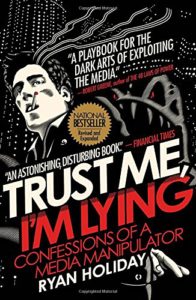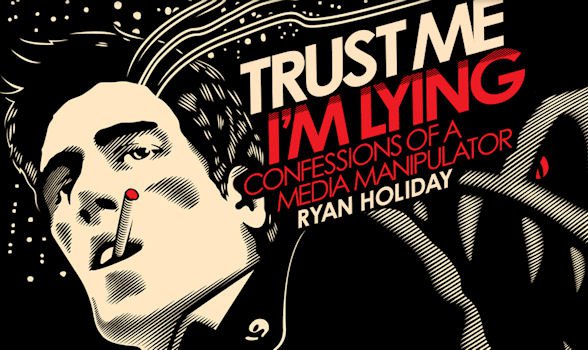 This book is a seminal book on PR and public relations. You absolutely MUST read it if you’re looking to get a better understanding of the inner-workings of the media.
This book is a seminal book on PR and public relations. You absolutely MUST read it if you’re looking to get a better understanding of the inner-workings of the media.
I have suspected many of the practices outlined in this book for quite a while. As a blogger, I’m very aware of how the media influences our perception and how it can be used for good and nefarious purposes.
If you’re a marketer, it’s easier than ever before to gain access to a large audience, but you have to know the tricks of the trade.
I’m actually really surprised that I have not heard this book mentioned more. Obviously, it’s done quite well, but it’s no where near as popular as it should be. This should be used as a textbook for any public relations professional.
Before I get into some of my notes on the book, I wanted to address two of the negative reviews on Amazon. First of all, literally every book on Amazon has that review saying that it could have been much shorter. This book is no exception. Personally, I think it was an appropriate length and found it to be a quick read.
Second, while I do think there is a clear underlying tone of disgust and the author is definitely trying to come off as a whistleblower, it’s quite simply a part of the book. He’s telling a story. I didn’t find the tone a turn-off at all and found a lot of value in the various points made.
Anyway, let’s get to some of the notes I took on Trust Me, I’m Lying!
The importance of public perception
“I created false perceptions through blogs, which led to bad conclusions and wrong decisions- Decisions in the real world that had consequences for real people.”
“We’re a country governed by public opinion, and public opinion is largely governed by the press, so isn’t it critical to understand what governs the press?”
“Create the perception that the meme already exist and all the reporter is doing is popularizing it.”
Make it clear that everyone is talking about it.
“You’ll notice that they tend to get story ideas from the same second-level sites, and by tailoring the story to those smaller sites, it sets you to up to be noticed by the larger one.”
How blogs work
“Exclusives build blogs. Scoops equal traffic.”
“Build a brand by courting controversy, breaking big scoops, driving comments, and publishing constantly.”
“In my line of work, it’s about encouraging those feelings however possible.” Warm and fuzzy or valued on a pedestal.
“Journalists are rarely in a position to establish the truth of an issue themselves, since they didn’t witness it personally.”
Leaking = more people seeing than an official statement.
“Blogs love press releases. It does every part of their job for them.”
“Writers are at the mercy of official sources, such as press releases, spokesmen, government officials, and media kits. And these are for the instances they even bother to check anything.”
Most journalists are looking to confirm or get support for what already are going to write. They just need a quote denying to justify publishing it.
“If something is a total bummer, people don’t share it.”
“The most powerful predictor of virality is how much anger an article evokes”
Sadness is a low-arousal emotion.
“Regardless of the topic, the more an article makes someone feel good or bad, the more likely it is to make the most emailed list.”
“I made it my strategy to manufacturer chatter by exploiting emotions of high valence: arousal and indignation.”
“Humiliation should not be suppressed. It should be monetized.”
Question marks can be used to make false statements that no one can criticize.
“He knew that the newspapers’s role was not to instruct but to startle.”
Way blogs have changed/newspapers. Write about what’s on everyone’s mind.
“If other blogs have covered something, competitors rush to copy them, because they assume there is traffic in it.”
“We know that practical utility doesn’t spread.”
“TV is a visual medium, he said, so to ask for the audience to think about something it cannot see would be suicide.” The medium is the message.
“Give a blogger an illusionary twenty-minute head start over other media sources, and they’ll write whatever you want, however you want.”
“That’s what web culture does to you. Psychologists call this the “narcotizing dysfunction,” when people come to mistake the busyness of the media with real knowledge and confuse spending time consuming that with doing something.”
Delegation of trust and research.
“Once anything is printed enough times in the media without challenge, it becomes fact.”
“Rile up the crowd by repeating sensational allegations and then pretend that they are waiting for the facts to come in.”
“We’re hearing…I wonder…Possibly…Lots of buzz that…Sites are reporting… Could…. Would… Should… They toss the news narrative into the stream without taking full ownership and pretend to be an impartial observer of a process they began.”
Rumors don’t have to be true. They just have to be talked about.
“Corrections appear to tighten their mind’s grip on the now disputed fact.”
“The more times an unbelievable claim is seen, the more likely they are to believe it.”
“The story of how we got it wrong.”
Leak a controversial ad
“To make us feel better by hurting others. To stress that the people we’re reading about are freaks, while we are normal.”
“The job of journalism is to prove surprise.”
“The media is a mechanism for systematically limiting the information seen by the public… The longer a user engages with it, the more comfortable they get and the more they believe in the world it creates.”
“From the pseudo environment came actual behavior.”
“The current system of delegated trust and deferred responsibility exists because readers have tacitly accepted the burden that blogs have abdicated.”
